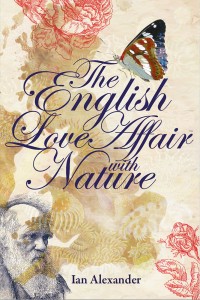
|
The English Love Affair with Nature tells the story of this extraordinarily long, tangled and passionate romance, how we fell in love, and why we are still mad about nature. www.obsessedbynature.com |
And on Kindle Pay with PayPal £12.50 (+ £2 postage) |
||||||||
Passionate landscapes with an engaging guide
Ian Alexander introduces his theme with a wink ..'the facts alone can be dry- but the bump and grind are not easy to put into words after the event.' So we can expect a factual account of the development of awareness of Nature – matched with a love affair. He's set himself a hard task – and he succeeds remarkably. Historically he describes the English using Newtonian science to liberate themselves from the mental constraints of a medieval God-centred universe. This uncovers the combined potential of the quest for discovery and also reveals Nature in the raw as it were, fit to be wooed and pursued. The scope of this passionate quest is phenomenal: from romantic poetry to village dogshows, from Victorian collectors to naval camouflage, traditional rural scenes to technical advancement. To a non-expert the research is impressively rigorous and credible. However, this is not a catalogue; more of a ramble - discursive, unevenly paced according to the ground covered, with pauses for perspective or reflection. Our author /guide keeps us company with beautifully described vignettes of natural observation; - lending a beguilingly personal quality to big themes. It is inevitably episodic- the kind of book that could be dipped into- but I found the story thread strong enough to keep me engaged from start to finish.
late eighteenth century the English people have been in love with nature
Ian Alexander’s book investigates the premise that since the late eighteenth century the English people have been in love with nature; with leisure time and literacy increasing and a rising number of available books about nature the love affair grew and with the population’s migration into the cities to fuel the industrial revolution’s need for workers the prevailing attitude altered from taking nature for granting to idealising it. Starting with the publication of Gilbert White’s ‘Natural History of Selborne’ and Thomas Bewick’s ‘A History of British Birds’ the relationship with nature is explored through a bewildering number of sources such as nineteenth century scientific pioneers Charles Lyell, Alfred Russell-Wallace and Charles Darwin but also landscape gardeners, romantic poets and modern children’s authors amongst many others. Another theme of the book is the multi-faceted nature of the word ‘nature’, from harsh agricultural drudgery to idealised rural fantasy and from the viewpoints of both individuals and society. Controversies over the age of the Earth and evolution are examined, brought to public attention by the developing sciences of geology, palaeontology and taxonomy. The growth of the conservation movement from the end of the nineteenth century is also explored. The discussions are framed by the author’s own observations of nature, clearly communicating his passion for the subject. The chronology, dramatis personae and bibliography provide an effective aid to further research on the ideas the book raises.